'We are seeing an era where only what Modi wishes is going to happen.'
'A clear message has now been sent to others that if this fate could befall on Nitin Gadkari, then just think what could happen to lesser mortals.'
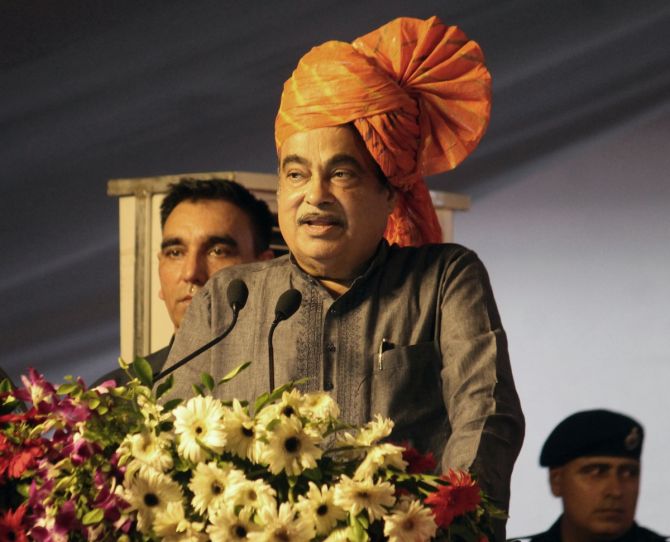
The Bharatiya Janata Party on Wednesday, August 17, 2022, dropped Union Minister Nitin Gadkari and Madhya Pradesh Chief Minister Shivraj Singh Chouhan from the BJP Parliamentary Board, the party's apex decision making body, and the Central Election Committee.
The party included six new faces in the 11-member Parliamentary Board in which the surprise face was of former Karnataka chief minister, B S Yediyurappa and former IPS officer Iqbal Singh Lalpura, the first Sikh leader to become a member of the BJP's apex body.
Syed Firdaus Ashraf/Rediff.com asked Nilanjan Mukhopadhyay, author of the The RSS: Icons of the Indian Right and Narendra Modi: The Man, The Times what the decision to drop senior leaders like Gadkari -- a former BJP president -- and Chouhan from the Parliamentary Board means to a party dominated by Narendra Damodardas Modi and Amit Anilchandra Shah.
How do you see the dropping of Nitin Gadkari from the BJP Parliamentary Board?
The decision has all the characters of a dramatic purge to underscore the power of a centralised leadership.
And it is about Prime Minister Narendra Modi's leadership. He brooks no discordance.
Nitin Gadkari had made some statements which could have been construed and suggested that he was unhappy with some aspects of the functioning within the party.
None of these statements was welcome. So, Modi has now brought Nitin Gadkari one notch below in the party by this move.
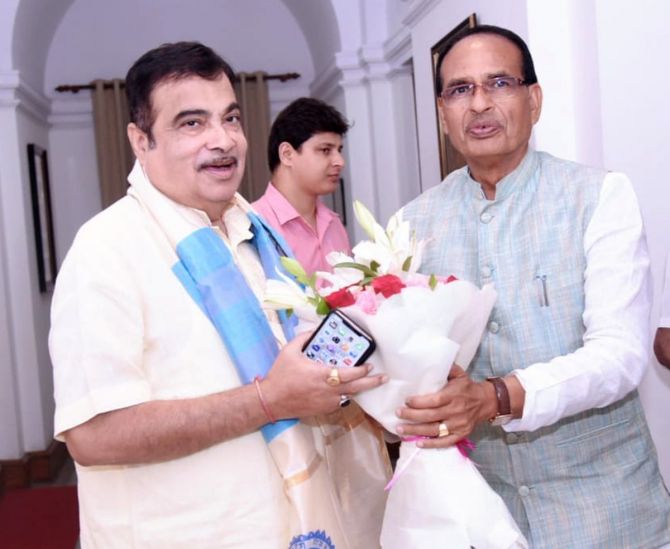
What about Madhya Pradesh Chief Minister Shivraj Singh Chouhan?
He has a history of being seen as a potential leader of the BJP prior to 2014.
In 2020, it became necessary for him to be brought back as the chief minister of Madhya Pradesh possibly because there was no other way for the leadership at that time as the Congress government had then collapsed in MP.
Now, they want to begin the process of cutting him down to size to ensure that he does not have a bigger role to play in the Parliamentary elections of 2024.
Madhya Pradesh is also going to the assembly elections towards the end of 2023 and I do not see him playing any role in that election -- there is a distinct possibility of him being replaced by the middle of next year on some pretext, maybe even moved to the Centre.
They can possibly bring in someone new to lead the party in the next assembly election.
Can you tell us what this BJP Parliamentary Board is, and also the Central Election Commission?
The BJP's Parliamentary Board in 2014 signified the largest symbolic body of collective leadership.
Post 2014, it is nothing but an official club to merely endorse a decision already taken.
It has very little power because decisions are made by the top leadership.
It is essentially an ornamental body post 2014 and so also the Central Election Committee.
The CEC used to decide on election tickets that were distributed, but now it is already decided somewhere else. The CEC will not take decisions, but endorse it.
These are formal bodies that will give stamp (on decisions taken by the top leadership).
You have to maintain a semblance for the sham of a democratically run party.
Significantly, no there is no Muslim in either body and although a Sikh, Iqbal Singh Lalpura, has been made member of the Parliamentary Board. The BJP considered Sikhs as part of Hindu Samaj, as Sikhism is treated as an Indic-religion.
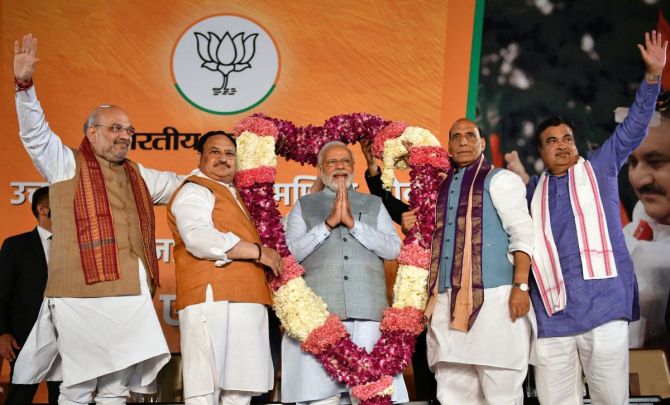
Has the BJP now become a Modi party just as the Congress is a Gandhi family party?
I think post 2014, the BJP has become more of a non-collective party than what it was prior to 2014.
After the 2015 Bihar election loss, four very senior BJP leaders -- L K Advani, Murli Manohar Joshi, Shanta Kumar, Yashwant Sinha -- wrote a letter to the then party president Amit Shah voicing serious concerns about the growing absence of intra-party debate and democracy.
It was indicated in 2015 which direction the party was going. But no corrective steps were taken and the party continued being run on authoritarian lines.
Post that year, the BJP has progressed several notches in that direction.
How has Rajnath Singh survived this long? He is the only former BJP president to survive.
Let us see how long he survives. He is necessary at the moment because you need to have some weighty leader from Uttar Pradesh.
The leadership does not want to bring in Yogi Adityanath to the parliamentary board.
Shivraj Singh Chouhan's removal sends a message that no BJP chief minister from any state will be a member of the Parliamentary Board.
This was made very clear after the results of the UP assembly election where Modi made it a point that the mandate from the electorate was exclusively for UP and was for Yogi Adityanath and he must stay in UP for the next five years till 2027.
What about Devendra Fadnavis being appointed to the Central Election Committee?
He was made to pay for his indiscretion and was publicly directed to become deputy chief minister, this after being chief minister of Maharashtra (from 2014 to 2019). He is being approached with a carrot and stick policy.
Earlier, a stick was shown to Fadnavis by asking him to accept the deputy chief minister's post and now he is being given a carrot.
Anyway, I don't see the Parliamentary Board or the Election Committee to be powerful bodies in the BJP now.

What about B S Yediyurappa who is 79 years old and finds a place in the Parliamentary Board? Technically, he should not be active in the BJP as Modi has set up a line of retirement age of 75 for BJP leaders.
His induction in the Parliamentary Board is a result of a serious confusion in the senior BJP leadership over what its Karnataka strategy should be.
I am not sure how long he will be a member of the Parliamentary Board, but making him a member could be a way to ensure that he does not create problems for the party in the Karnataka assembly elections.
His presence is also to balance the presence of B L Santosh (the BJP national general secretary [organisation]) who is there in an ex-officio capacity.
I don't think the leadership will be able to answer coherently the question why did you appoint him (Yediyurappa). They will not have any clear answer.
The new culture in the BJP seems to be Modi is God and that every leader in the party must pay homage to him to survive. Is it so?
I have written that sycophancy is at an all time high in Indian history now.
Ramchandra Guha in his recent interview with Karan Thapar said the cult of Mr Modi is the highest in history anywhere in the world.
I would say that his view needs to be seriously considered by Indians.
We are seeing an era where only what Modi wishes is going to happen.
Anybody who has any different way of looking at any issue will not be tolerated within his party.
A clear message has now been sent to others that if this fate could befall on Nitin Gadkari, then just think what could happen to lesser mortals.
Does all this resemble Xi Jinping's Chinese Communist party or Stalin's USSR?
This is the closest that India can come to a Stalinist purge.
Except the fact that people are not being sent to Siberia as Stalin used to do to his opponents or shoot them.
It is not that at this moment. Nothing like that. Therefore, I said it is the closest that can be there.
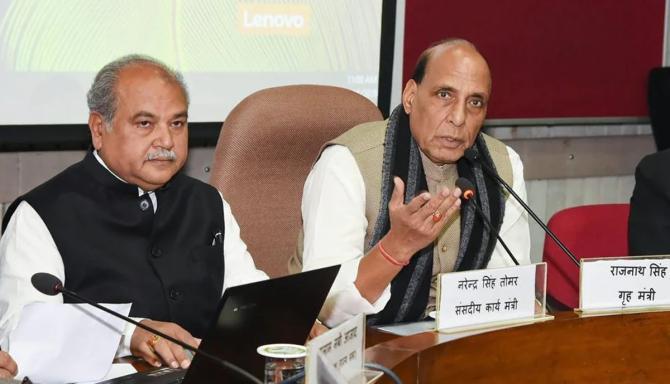
Only 4 BJP ministers from 2014 have survived: Rajnath Singh, Nitin Gadkari, Narendra Singh Tomar, Smriti Irani. Why did loyalists like Ravi Shankar Prasad and Prakash Javdekar lose their jobs?
At times, blame has to be apportioned at somebody's door. Somebody has to be a fall guy.
There was an error in the government policy as evident in recent developments regarding the decision to withdraw the Data Protection Act.
There was overzealousness on the government's part that backfired.
Now, the decision was taken by the leadership and the leadership could not take the blame.
Somebody had to take the blame in the government, so it was Ravi Shankar Prasad.
Now, if Ravi Shankar Prasad wants to see a future for himself, he has to continue to trumpet the leadership's decisions, which he is doing.
If he had decided to be silent, then he would have been silenced in the party forever.
By continuing to be a trumpeter for the leadership, he is hoping that at some point he will be picked out from the cold.
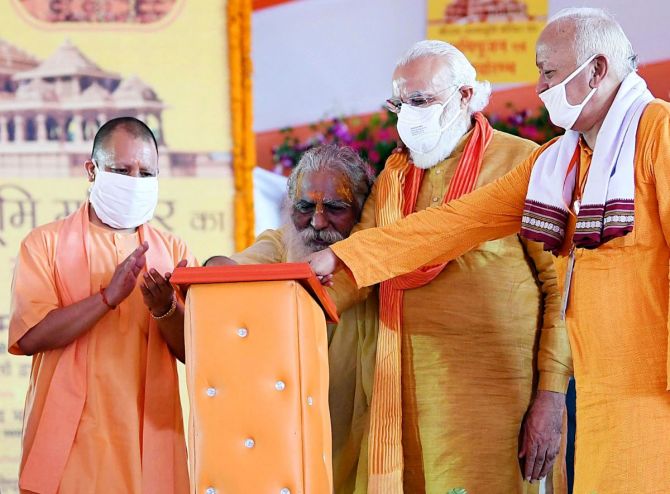
Did RSS Sarsanghchalak Mohan Bhagwat not have any say on ousting Nitin Gadkari, who is seen as close to the Sangh?
The RSS has become completely irrelevant by its complete subservience to the party leadership in the last eight years.
It is too late in the day for the RSS leadership to assert itself.
Nitin Gadkari is very close to the RSS as he is from Nagpur where the RSS headquarters is located.
He was personally chosen by Mohan Bhagwat to become the party president when he took over from Rajnath Singh in 2009. Let us not forget that.
Dropping Nitin Gadkari is also a message to the RSS leadership and Mohan Bhagwat.
The RSS believes in the primacy of the organisation over the individual and in the present circumstances it is reverse within the BJP.
The individual is more important than the institution or the organisation.
Feature Presentation: Rajesh Alva/Rediff.com












 © 2025
© 2025